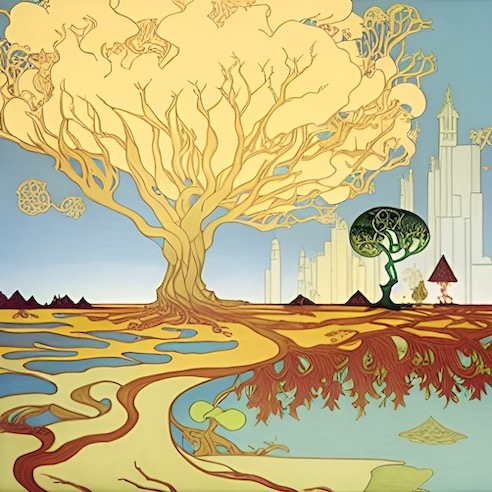This is a thought provoking address by Dr. Scott Leatherdale Five thoughts of a dying professor and a valuable one to address not only to a convocation group, but it applies to many, I would say.
Once can say that the address is a powerful testimony of Dr. Scott's life and is an inspiring motivation to all. When I reflect on the five thoughts I draw parallel with my own experience. How do I relate to the 5 thoughts and to what extent?
First, be proud.
I come from a family where finishing high school was considered a major feat at that point in time. Neither my parents nor their siblings lacked the capability but rather it was more of circumstantiality which made the choice obvious. Getting a secured office job is the best that people "our level" can achieve. With the exception of a few, who went on to graduate from University with full scholarship and another eventually through own effort. They were looked upon with admiration and we were constantly told "Study hard, and be like your ... "
My own parents, brilliant and I am confident that they would have been very established professionals had the chance been given. Both had elementary level of schooling which did not stop them from continuously learning and picking up new skills despite not having a formal degree. I somehow was lucky enough to graduate with a Degree despite not really knowing how it happened. But I think that was mainly due to the fact that I was not given the pressure to earn for the family. I had a fairly comfortable and free childhood. Not that we have a lot then, but we live simple and satisfied lives. At least to me. I never knew the struggles my parents had. I have only heard war stories from my grandparents. I did not feel that life was difficult. Life just was, within a closely knit family (and extended family members). I never imagined that I would drop out of Form 6. Still, my parents put together all they had to send me to college. And then I graduated, Certificate, Diploma, Advanced Diploma and BSc (Cum Laude). I attended my Diploma convocation because my friends asked me to. I borrowed my auntie's shoes, and I think a decent jacket and skirt. I also attended my BSc convocation. I went on to complete my Masters on a full scholarship but my parents were not able to join me at the convocation as it would have been too expensive. I graduated in absentia. I attended my final Doctorate convocation after many years, I attended with my parents but I felt estranged. I felt odd and out of place. I wish I had been proud. Proud of myself, and realise that my parents were extremely proud of me. And all that I have done, up and until this point. It may not be much for me, it may not be much for my surroundings - but I know my parents are proud. And for that, I too should be proud.
Second, take risks
I certainly did not take much risks, for fear of the unknown and uncertain. Going on to finishing a degree, a Masters was my sole objective. And for that I became a lecturer in order to get a scholarship to pursue my Masters Degree. Hence the path was clear. After completing my Masters I decided to focus on my family life, settling down as a mother and wife. I was contented. I thought then that my ambition was to be a home maker. Maybe when the timing is right, I will "resume studies". There was minimal risk and I thought everything was calculated and went as planned. I was not aware that I was accummulating loads of stuffs inside me. When one least expect it, life throws a curveball. I am fortunate to have realised and even more fortunate to receive the support from my parents when I made a decision that would change my entire life. It was a decision that I could not explain to anyone. It was a decision that would affect more than just myself. But it was a decision that I reckon was necessary. And that was the first of a very big risk that I have taken.
Third, tolerance and understanding
One of the most important lessons that Dr. Leatherdale shared in his speech is this:
As you move forward in life, try not to be the person who simply shouts the loudest if somebody has a different opinion than you, but rather strive to be the person who effectively works for change while also listening and trying to understand why some people may see the world differently
Listening deeply is not just hearing the words, but grasping the meaning and emotions behind them. It requires being fully present, attentive, and curious, without interrupting, judging, or arguing. It also involves acknowledging, validating, and reflecting back what you have heard, and asking open-ended questions to encourage further responses.
Understanding comes with the capacity to accept. The openess in heart that allows one to listen deeply to understand instead of to answer. Gradually, it opens up one's heart and along with that, I find that many things will become easier to accept. There is no need to take sides, no need to make sure a point is made. In turn, this gives freedom. What I end up getting is a kind of liberation that heals. And all these begin with deep listening.
Fourth, move past rejection and failure
Being able to loosen the grasping to past experiences is important to move forward. Carrying a lot of baggage will not only slow one down but also makes one consricted. At the same time it is also liberating. Often, we cling on to what is familiar and being light is not one of them. Dwelling in a state of heaviness, applying self imposed rigidity in the name of holding on the principle is not only detrimental. It is demotivating and debilitating. We have all failed at one poin or another. But it is not failure. It is a trial and error process that one undergoes to arrive. It is not about making progress. It is about being. Just be. As long as we differentiate between success and failure, we remain in the trap that we have put ourselves into. Because then, we are subject to conditions and out tendencies to control the conditions in the name of "managing" expectations. Who is there to manage and who is being managed in the first place?
Fifth, be resilient!
Be what you truly are. How do we know when we are being what we aren't? Anything that is guided by greed, hatred (anger) and delusion - you will be what you think you are. When you are truly resilient, you will be because you are no longer shaped and guided by thoughts which are mainly mental formations and conditions. According to the Ven. Thich Nhat Hanh,
Resilient trees can weather a storm because their roots are deep and firm.

This implies that we need to cultivate our inner strength and stability by being aware of ourselves and cultivating compassion. Foremost, we need to learn how to be kind to ourselves. To do that we have to consider what it means to be kind to oneself and by connecting with our true nature. By doing so, we can overcome the challenges and difficulties that we face in life, and we can be more resilient and happy.
Years later, I went on to assist in a book Water Drop on Lotus Leaf by Ven. Andhra Analayo. That was the beginning of a journey on struggles, discovering the meaning of struggles and experiencing first hand, how one resort to replacement in search of gratification. But this is not the focus of this post. Maybe one day, I will write a post on this. Until then...
The five thoughts of a dying professor offer valuable insights into how to live a meaningful and fulfilling life. They also remind us of the impermanence and interdependence of all phenomena, which are central teachings of Buddhism. According to Ven. Thich Nhat Hanh, death is not an end, but a transformation and continuation of life in different forms. As he says,
“Our true home is not in the past. Our true home is not in the future. Our true home is in the here and the now. Life is available only in the here and the now, and it is our true home.”

Reference
[1] “Five thoughts of a dying professor,” Waterloo News, Jun. 19, 2023. https://uwaterloo.ca/news/five-thoughts-dying-professor (accessed Jun. 23, 2023).
[2] Nhất Hạnh, Thích, Fear : essential wisdom for getting through the storm. New York: Harperone, 2012.